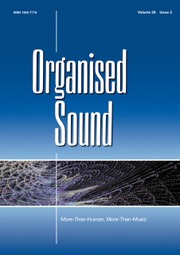Article contents
Imagining through Sound: An experimental analysis of narrativity in electronic music
Published online by Cambridge University Press: 11 November 2016
Abstract
The highly rewarding experience of electronic music persists throughout our daily lives. Our immediate environments are replete with events that emit sounds that are extremely complex. Electronic music engages with the listening habits we take for granted in our everyday lives, and reveals how intricate they can be. Inspired by such intricacies, I have conducted a series of listening experiments with 80 participants over the course of three years to explore the cognition of electronic music. In this article, I will first present the method and the results of this experiment, including a categorical analysis of mental associations evoked by different works of electronic music. Next, I will offer a discussion of narrativity in electronic music supported by these results and diverse perspectives on narrativity from a number of disciplines. I will then construct a definition of gestures as narrative units in electronic music in relation to events in the environment. In doing so, I will bring together various theories on electronic music with not only the findings of the current study but also existing research on auditory cognition.
- Type
- Articles
- Information
- Copyright
- © Cambridge University Press 2016
References
REFERENCES
- 2
- Cited by


